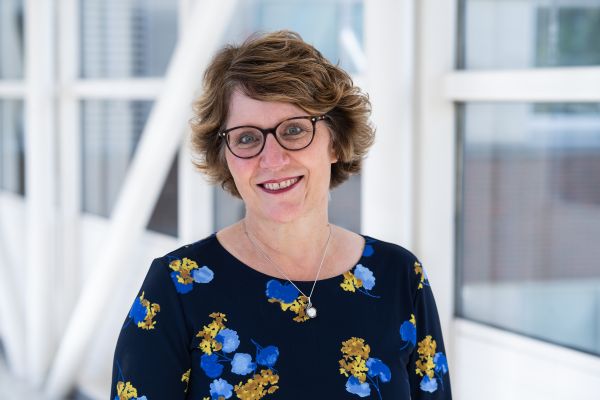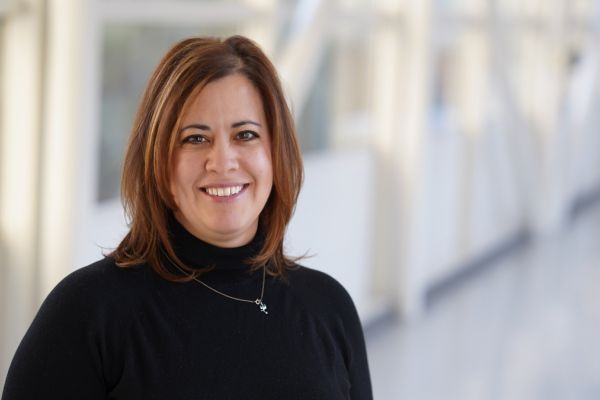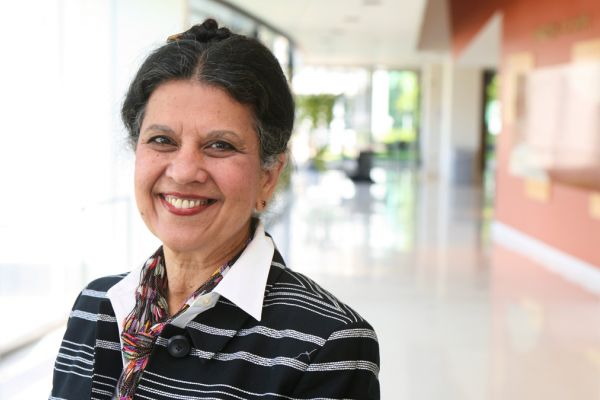For medical oncologist and researcher Shipra Gandhi, MD, Assistant Professor of Oncology specializing in breast cancer in the Department of Medicine at Roswell Park Comprehensive Cancer Center, the path to physician-scientist was clear from the very beginning.
“I was raised in a family of physicians. Both my parents are doctors, and I grew up listening to their conversations about managing difficult cases, so I was very interested in the field of medicine from an early age,” says Dr. Gandhi, who was born and raised in India. Dr. Gandhi attended the prestigious Lady Hardinge Medical College in New Delhi and worked on a project funded by the Indian Council of Medical Research that investigated advanced methods of tuberculosis detection. “I knew from the very beginning that I wanted to become a doctor. But I was also interested in new discoveries, so I knew that in addition to taking care of patients, I somehow wanted to be actively involved in research to move the field forward.”
Inspired by other women in science
Like many other women who choose a career in medicine, Dr. Gandhi was influenced by other female scientists along the way.
“I have been very lucky to have excellent mentors in my life,” says Dr. Gandhi. “The best teacher I’ve ever had was my sixth-grade science teacher. Her passion for science and her love of teaching inspired me to become not only a doctor but also a scientist. She taught me to read what is written but question where this literature came from. She always encouraged her students to ask questions and answered every question with great enthusiasm, and that made learning so much fun.”
Later, during her internal medicine residency at State University of New York at Buffalo, Dr. Gandhi had the fortune of working under the supervision of Renuka Iyer, MD, Co-Director of the Liver and Pancreas Tumor Center at Roswell Park and world-renowned medical oncologist specializing in rare gastrointestinal cancers. “I remember watching Dr. Iyer work and being amazed by her dedication to both her patients and her research. It was quite inspiring to see her expertise and skill in both areas. I was fortunate that Dr. Iyer mentored me during my residency and continues to mentor and guide me to this day, even though we now work in different fields.”
Moving the oncology field forward
As Dr. Gandhi rotated through different specialties during her residency, she learned quickly that she wanted to be an oncologist. “I saw the way oncologists took care of the patients and formed a special bond that I didn’t see in other specialties, and I knew that I wanted to have that sort of relationship with my patients,” she says. “What I also love about working in oncology is that there are always new developments. What is true today may not be true next year, because we are always developing new drugs and treatments. The field is evolving very rapidly, and I enjoy being part of that process. The ability to offer my patients more and more effective treatments is very rewarding, and it takes us one step closer to a cure.”
Since she landed at Roswell Park’s Department of Medicine, where she runs early-phase clinical trials in patients with breast cancer, Dr. Gandhi has written more than 30 peer-reviewed publications and received research grants from the National Institutes of Health and Department of Defense.
Examining the link between stress and cancer
Her recent notable contributions include a closer investigation of the impact of stress on cancer. Working together with Elizabeth Repasky, PhD, Co-Leader of the Cell Stress and Biophysical Therapies Program at Roswell Park, and other Roswell Park specialists, Dr. Gandhi was the first to show in a prospective clinical trial that a beta-blocker, propranolol, which has been in use for decades to treat or prevent conditions ranging from migraine headache to heart arrythmias, is safe and possibly effective when used in combination with pembrolizumab, an immunotherapy also known as Keytruda that has become standard therapy for patients newly diagnosed with advanced or metastatic melanoma.
When patients with melanoma were given escalating doses of propranolol, which blocks the ability of stress hormones to interact with cells, in addition to standard treatment with pembrolizumab, they showed higher anticancer responses than expected with standard therapy alone. Dr. Gandhi is hopeful that this effect will extend to other cancers as well, and she is currently planning a clinical trial to test how beta-blockers can help patients with breast cancer.
“Most of the patients with breast cancer who I see obviously have stress, and many believe that stress contributed to their cancer and will affect their treatment outcome. These patients often ask about stress-reduction strategies such as yoga and meditation. It is well known that stress increases both the incidence of cancer and mortality in breast cancer, so I believe that this question of the impact of stress is very relevant in breast cancer.”
Never miss another Cancer Talk blog!
Sign up to receive our monthly Cancer Talk e-newsletter.
Sign up!Curing Breast Cancer and Beyond
Among several clinical trials that Dr. Gandhi is currently running is a much-anticipated examination of the effectiveness of dendritic cell vaccines in patients with brain metastasis from HER2-positive or triple-negative breast cancer, where she sees the possibility of not only curing cancer but also preventing cancer recurrence. “Being an active part of moving the field forward is very exciting, but when I can help cure a patient with cancer, the feeling I get is beyond joy. We can do that for some cancers, such as stage I-III early breast cancers, but I would like to see the same for all patients, especially those with stage IV breast cancer. The opportunity to cure cancer is what really motivates me.”




